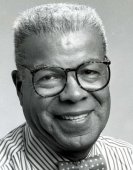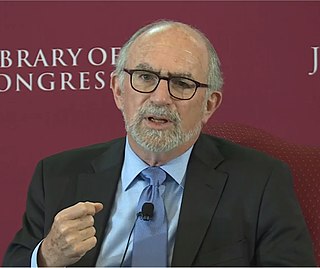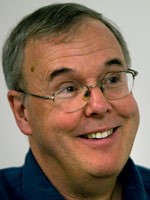Media bias occurs when journalists and news producers show bias in how they report and cover news. The term "media bias" implies a pervasive or widespread bias contravening of the standards of journalism, rather than the perspective of an individual journalist or article. The direction and degree of media bias in various countries is widely disputed.

The Medill School of Journalism is the journalism school of Northwestern University. It offers both undergraduate and graduate programs. It frequently ranks as the top school of journalism in the United States. Medill alumni include over 40 Pulitzer Prize laureates, numerous national correspondents for major networks, many well-known reporters, columnists and media executives.
Agenda-setting theory suggests that the communications media, through their ability to identify and publicize issues, play a pivotal role in shaping the problems that attract attention from governments and international organizations, and direct public opinion towards specific issues. The theory suggests that the media can shape public opinion by determining what issues are given the most attention, and has been widely studied and applied to various forms of media. The way news stories and topics that impact public opinion are presented is influenced by the media. It is predicated on the idea that most individuals only have access to one source of information on most issues: the news media. Since they establish the agenda, they may affect how important some things are seen to be.

The E. W. Scripps School of Journalism is the namesake school of the Scripps College of Communication at Ohio University seated in the Schoonover Center for Communication. Founded in 1924, the school has been recognized by The Associated Press and U.S. News & World Report for excellence in instruction and research in the fields of journalism and mass communications. The program has attracted more than $54 million in grants, awards, and investments. The School of Journalism is accredited by the Association for Education in Journalism and Mass Communication.

Charles Sumner "Chuck" Stone, Jr. was an American pilot, newspaper editor, journalism professor, and author. He was a member of the Tuskegee Airmen during World War II and was the first president of the National Association of Black Journalists, serving from 1975 to 1977. Passionate about racial issues and supportive of many liberal causes, he refused to follow any party line, "but called the issues as he saw them."
In media studies, mass communication, media psychology, communication theory, and sociology, media influence and themedia effect are topics relating to mass media and media culture's effects on individuals' or audiences' thoughts, attitudes, and behaviors. Through written, televised, or spoken channels, mass media reach large audiences. Mass media's role in shaping modern culture is a central issue for the study of culture.
Claims of media bias generally focus on the idea of media outlets reporting news in a way that seems partisan. Other claims argue that outlets sometimes sacrifice objectivity in pursuit of growth or profits.
Ed Guerrero is an American film historian and associate professor of cinema studies and Africana studies in the Department of Social and Cultural Analysis at New York University Tisch School of the Arts. His writings explore black cinema, culture, and critical discourse. He has written extensively on black cinema, its movies, politics and culture for anthologies and journals such as Sight & Sound, FilmQuarterly, Cineaste, Journal of Popular Film & Television, and Discourse. Guerrero has served on editorial and professional boards including The Library of Congress' National Film Preservation Board.
James W. Chesebro was Distinguished Professor of Telecommunications in the Department of Telecommunications at Ball State University. He received his Ph.D. from the University of Minnesota in 1972.
Peace journalism is a style and theory of reporting that aims to treat stories about war and conflict with balance, in contrast to war journalism, which peace journalism advocates say display a bias toward violence. The theory proposes practical methods for correcting biases in stories appearing in the mainstream and alternative media, and suggests ways for journalists to work with other media professionals, audiences, and organizations in conflict.

Bruce W. Jentleson is a professor of public policy and political science at Duke University, where he served from 2000 to 2005 as Director of the Terry Sanford Institute of Public Policy. He previously was a professor at the University of California, Davis and Director of the UC Davis Washington Center. In addition to his academic career, he has served in a number of foreign policy positions in Democratic administrations.
The Goldsmith Book Prize is a literary award for books published in the United States.

Dietram A. Scheufele is a German-American social scientist and the Taylor-Bascom Chair in the Department of Life Sciences Communication at the University of Wisconsin–Madison. He is also a Distinguished Research Fellow at the University of Pennsylvania's Annenberg Public Policy Center. Prior to joining UW, Scheufele was a tenured faculty member in the Department of Communication at Cornell University.
In the social sciences, framing comprises a set of concepts and theoretical perspectives on how individuals, groups, and societies organize, perceive, and communicate about reality. Framing can manifest in thought or interpersonal communication. Frames in thought consist of the mental representations, interpretations, and simplifications of reality. Frames in communication consist of the communication of frames between different actors. Framing is a key component of sociology, the study of social interaction among humans. Framing is an integral part of conveying and processing data daily. Successful framing techniques can be used to reduce the ambiguity of intangible topics by contextualizing the information in such a way that recipients can connect to what they already know.

W. Russell Neuman is Professor of Media Technology, NYU Steinhardt School of Culture, Education, and Human Development and Professor (Emeritus), Communication Studies, University of Michigan. From 2001 to 2013, Dr. Neuman was the John Derby Evans Professor of Media Technology at the University of Michigan. Neuman received a Ph.D. And M.A. At the University of California, Berkeley Department of Sociology as well as a B.A. from Cornell University's Department of Government. He has an extensive teaching and research career at Yale University, Harvard University, University of Pennsylvania, and the University of Michigan. He is one of the founding faculty members at MIT Media Lab and with Ithiel de Sola Pool, MIT's Research Program on Communication Policy. From 2001-2003 he served as a Senior Policy Analyst in the White House Office of Science and Technology Policy working in the areas of information technology, broadband policy as well as biometrics and international security.
Transgender studies, also called trans studies or trans* studies, is an interdisciplinary field of academic research dedicated to the study of gender identity, gender expression, and gender embodiment, as well as to the study of various issues of relevance to transgender and gender variant populations. Interdisciplinary subfields of transgender studies include applied transgender studies, transgender history, transgender literature, transgender media studies, transgender anthropology and archaeology, transgender psychology, and transgender health. The research theories within transgender studies focus on cultural presentations, political movements, social organizations and the lived experience of various forms of gender nonconformity. The discipline emerged in the early 1990s in close connection to queer theory. Non-transgender-identified peoples are often also included under the "trans" umbrella for transgender studies, such as intersex people, crossdressers, drag artists, third gender individuals, and genderqueer people.
Racial biases are a form of implicit bias, which refers to the attitudes or stereotypes that affect an individual's understanding, actions, and decisions in an unconscious manner. These biases, which encompass unfavorable assessments, are often activated involuntarily and without the awareness or intentional control of the individual. Residing deep in the subconscious, these biases are different from known biases that individuals may choose to conceal for the purposes of social and/or political correctness. Police officers have implicit bias, regardless of their ethnicity. Racial bias in criminal news reporting in the United States is a manifestation of this bias.
Political bias is a bias or perceived bias involving the slanting or altering of information to make a political position or political candidate seem more attractive. With a distinct association with media bias, it commonly refers to how a reporter, news organisation, or TV show covers a political candidate or a policy issue.

Douglas Mark Underwood is an American journalist and media studies scholar. He is a Professor of Communication at the University of Washington.
James N. Druckman is an American political scientist who was elected to the American Academy of Arts and Sciences in 2012.






